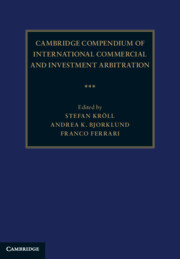Book contents
- Cambridge Compendium of International Commercial and Investment Arbitration
- Cambridge Compendium of International Commercial and Investment Arbitration
- Copyright page
- Contents
- Figures
- Tables
- Contributors
- Preface
- Part I Foundations
- Part II Public Law Questions Relating to Arbitration
- Part III Stakeholders in Arbitration
- Part IV Applicable Law
- Part V Jurisdiction of the Arbitrator
- Part VI The Arbitral Tribunal
- Part VII Procedural Questions in Arbitration
- Part VIII Role of State Courts in Arbitration
- Part IX Awards
- Part X Post-Award Issues
- Part XI Legal Concepts
- 53 Parallel Proceedings in International Commercial Arbitration
- 54 Res Judicata in International Arbitration
- 55 International Arbitration and Transparency
- 56 Contract and Treaty Interpretation in International Arbitration
- Part XII Areas of Concern
- Part XIII Arbitration and Related Fields
- Part XIV EU Law and Arbitration
54 - Res Judicata in International Arbitration
from Part XI - Legal Concepts
Published online by Cambridge University Press: 18 February 2023
- Cambridge Compendium of International Commercial and Investment Arbitration
- Cambridge Compendium of International Commercial and Investment Arbitration
- Copyright page
- Contents
- Figures
- Tables
- Contributors
- Preface
- Part I Foundations
- Part II Public Law Questions Relating to Arbitration
- Part III Stakeholders in Arbitration
- Part IV Applicable Law
- Part V Jurisdiction of the Arbitrator
- Part VI The Arbitral Tribunal
- Part VII Procedural Questions in Arbitration
- Part VIII Role of State Courts in Arbitration
- Part IX Awards
- Part X Post-Award Issues
- Part XI Legal Concepts
- 53 Parallel Proceedings in International Commercial Arbitration
- 54 Res Judicata in International Arbitration
- 55 International Arbitration and Transparency
- 56 Contract and Treaty Interpretation in International Arbitration
- Part XII Areas of Concern
- Part XIII Arbitration and Related Fields
- Part XIV EU Law and Arbitration
Summary
Res judicata, or claim preclusion, is no less important a matter in international arbitration than in national court litigation. Nothing less than the finality of an adjudication is at stake.In principle, a tribunal should decline to adjudicate a dispute if it has already been adjudicated either in a prior judgment or award. Apart from all the disadvantages of duplicative proceedings, a tribunal’s failure to treat a prior adjudication as preclusive made lead to set aside of its award.Even if an adjudication is final and binding, or in the case of an award entitled to recognition, certain so-called “identities” must be established, whether identity of party, identity of claim, or identity of object, or all of the above. But how are they to be defined? Herein lies the difficulty for tribunals.The requirements of res judicata are a matter of forum law and, unlike a national court, an arbitral tribunal has no forum law and derives little if any guidance from the parties’ agreements, arbitration laws or institutional rules. Tribunals have a choice-of-law challenge, their best options being the res judicata norms of one body of national law or another and an international standard if one can be ascertained.
- Type
- Chapter
- Information
- Publisher: Cambridge University PressPrint publication year: 2023

